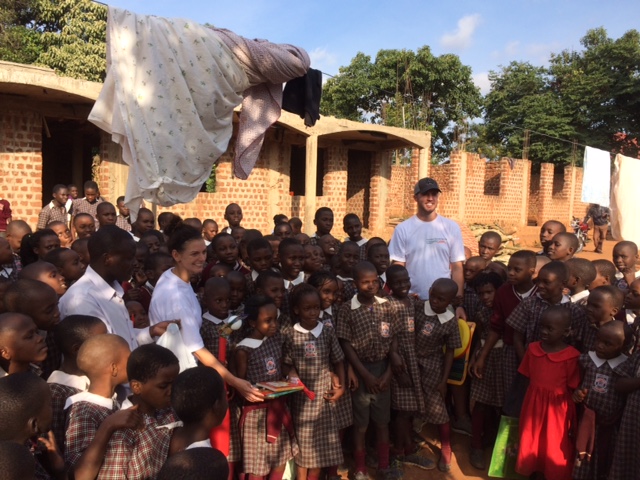Welcome, world-changers! 🌍 In your search for meaningful ways to impact lives and environment positively, have you ever considered the ‘Pearl of Africa’, Uganda? Riddled with numerous challenges from poverty to education, economy, and water quality, this beautiful East African country offers a myriad of opportunities for volunteers.
The purpose of this article is to shed light on these challenges and, most importantly, to reveal the array of volunteer opportunities that await in Uganda. So, get ready to gain insight into how your time, skills, and sheer will can contribute to sustainable development and transform lives in Uganda! 🇺🇬
State of Poverty, Vulnerability, and Inequality in Uganda
Introduction:
Uganda is often considered a vibrant and diverse country, home to breathtaking landscapes and a rich cultural tapestry. Yet, beneath the surface, it grapples with a high prevalence of poverty, food insecurity, and social inequality. The intersection of these socio-economic challenges poses a considerable strain on the country’s growth and sustainability. However, the people of Uganda are marked by their resilience and determination to create a brighter future. Let’s delve into the socio-economic issues affecting this East African nation and the attempted mitigating strategies.

Impact of the Pandemic on Jobs
The global pandemic has significantly exacerbated Uganda’s socio-economic challenges. It resulted in lost livelihoods, prompting a worrying rise in poverty rates. Job losses were particularly pronounced in sectors heavily reliant on human interaction, such as tourism, entertainment, and service industries. This fallout from the pandemic has far-reaching implications, impacting not just the individual but also the family and community.
Predicted Poverty Rate Reduction
Despite these hurdles, there’s a glimmer of hope amidst these testing times. According to The World Bank, Uganda’s poverty rate is predicted to reduce from 41.7% in 2023 to 40.7% by 2025. This forecast is attributed to accelerated growth strategies, including investment in public infrastructure, improved governance, and sustainable land-use practices.
While these predictions signal a potentially hopeful trajectory, it’s vital to consider that these strategies’ success hinges on numerous delicate socio-political factors. But, there is no denying that any decrease, even a slight one, offers a beacon of hope for the Ugandan people.
Land Degradation and Economic Vulnerability
One of the lesser-known aspects of Uganda’s socio-economic challenge is land degradation. Approximately 41% of the country’s land is degraded, a problem which carries significant economic vulnerabilities.
Degraded land results in low productivity, leading to food insecurity, income loss for farming communities, and increased poverty levels. Additionally, it exacerbates climate vulnerability as essential ecosystems are impacted.
Addressing land degradation is, therefore, a crucial factor in alleviating poverty and reducing economic vulnerability in Uganda. It also has broader implications for the country’s resilience against climate change and environmental sustainability.
The state of poverty, vulnerability, and inequality in Uganda is complex, laced with interconnected socioeconomic and environmental issues. It’s not a simple problem to solve, and there’s nothing straightforward about the solutions. It requires the concerted effort of policymakers, non-governmental organizations, and most importantly, the Ugandan people to surmount these challenges.
In the face of adversity, the spirit of resilience evident in the Ugandan people is inspiring, giving us optimism that these projected reductions in poverty rates are within reach. Indeed, the story of Uganda is not merely that of struggle but is also a testament to resilience, endurance, and the unyielding hope for a better tomorrow.
Education Challenges in Uganda
Uganda’s education sector is faced with a myriad of challenges that have immensely hindered quick progress in this East African nation. These issues, both daunting and pervasive, are without doubt, largely to blame for the staggeringly low levels of literacy and general education achievement in the country today. But amongst these challenges, the one that takes an exceedingly big toll on the education landscape in Uganda is the alarmingly low primary school completion rate.
Low Primary School Completion
Stepping into the world of Uganda’s educational framework, one quickly perceives a concerning scenario. Nearly 50% of children in Uganda do not complete primary school. Frowning yet? 😕 It’s indeed a grim reality that such a large number of young minds are being stripped off their opportunity for a basic education.
There are plenty of reasons contributing to this disheartening trend. Factors such as limited school resources, high levels of poverty, and cultural barriers all weigh heavily on children’s ability to stay in and complete primary school. Here are some detailed insights into these issues:
- Limited school resources: Schools often suffer from a lack of essential resources for effective teaching, such as textbooks, classroom facilities and well-trained teachers. This can demotivate students and lead to high dropout rates.
- High levels of poverty: In families grappling with financial hardships, children are often compelled to drop out of school and engage in child labor to contribute to household incomes.
- Cultural barriers: Unfortunately, some cultural norms and beliefs in Uganda undermine the education of children, particularly girls. Such beliefs lead to early marriages, keeping girls out of school.
It’s time we face these truths head-on and commit to their resolution. Every child in Uganda deserves a chance to unfurl their potential, to chase their dreams, and to script their success story. ❤️ And the first step towards achieving that, is ensuring they complete their primary education.
While we’ve only scratched the surface of the issue, initiating dialogues on this pressing challenge could indeed be the first step towards understanding and solving it. After all, aren’t open conversations and shared insights the catalysts for lasting change? Let’s keep the conversation going!
Economic Growth and Urbanization in Uganda
The African nation of Uganda, often referred to as the “Pearl of Africa,” has been a spectacle of progressive change and growth over the years. The past two decades have seen this relentless dynamo experience astounding economic growth. Still, like any multidimensional story, this growth is accompanied by a stir of population movements from rural areas to burgeoning urban centers. These movements have painted a complex canvas variegated with distinct shades of urbanization, though often into informal settlements.
Think of it this way: as the Ugandan economic engine hums along more robustly, it’s as if it’s giving off a magnetic pull. This pull is drawing people from the broad, open-spaces and simplicity of rural areas into the congested streets, electrifying energy, and potential opportunities of urban centers.
Let’s delve into the factors that make this transition irresistible to many:
- Potential Job Opportunities: Economic growth often equals more job opportunities, especially in urban centers. The promise of work, income, and improved living standards is an irresistible pull for many living in rural sectors.
- Bright City Lights: The aesthetics and conveniences of the city are powerful appeal factors. From access to amusement parks to modern amenities and shopping malls, the allure of city life often proves irresistible.
- Education & Healthcare: Cities typically offer better access to quality education and healthcare services. For families, this means an opportunity for their children to gain quality education and a better future.
Yet, this population shift is not without its drawbacks:
- Crowded Informal Settlements: Many of the arriving rural inhabitants settle in unplanned, informal areas around cities. This leads to congestion and strains existing infrastructure.
“When growth gives rise to a fast-paced urbanization trend, challenges are bound to crop up. Yet, there’s also an air of hope fluttering about. Opportunities for development occur, infrastructure improves, lives can potentially transform,” mused a resident of Kampala.
Through the ambiguity of it all, one thing is certain: as long as economic growth continues, so will Uganda’s urbanization narrative. The challenge for the nation, therefore, is managing this growth in a way that increases the benefits while mitigating the associated issues. Who knows, with effective urban planning and sustainable policies in place, Uganda may yet write a compelling success story in its urbanization saga.
Water Quality Challenges
Surely you’ve heard some stories or read articles about water quality challenges around the world, right? We’re going to narrow that lens a bit and focus on a region that faces significant hurdles in this area – Uganda. 🌍💧
Uganda, like other developing countries, faces multiple issues that affect the availability, access, and quality of water. These problems pose enormous threats to human health, ecosystem health, and the country’s economic development.
Now, let’s dig a bit deeper and look at some unique factors that contribute to these water quality challenges in Uganda.
- Population growth: The rapid population growth in Uganda increases demand for water, placing immense pressure on existing water resources.
- Climate change: Changes in rainfall patterns and increase in temperatures affect water availability and quality. Uganda, being an equatorial country, is highly vulnerable to these impacts.
- Improper waste disposal: Waste, especially plastics and other non-biodegradable materials, often end up in water bodies, significantly reducing water quality.
- Agricultural run-offs: Fertilizers, pesticides, and other chemicals used in farming run off into water bodies, leading to eutrophication and contamination.
- Industrial pollution: Industries release untreated effluents into water bodies, which introduces harmful chemicals and heavy metals into the water.
Each of these factors plays a significant role, acting as a cog in a very complicated machine. The consequences can be dire for both people and the environment. And while the situation may seem bleak, getting to understand the root causes of these challenges is the first step towards making a difference.
In the face of these water quality challenges in Uganda, fostering awareness, advancing policies, and embracing innovative solutions can transform the future of water quality in the region. Here’s to clear blue waves lapping at the shores of Lake Victoria in years to come! 🌊 In the world of water quality, awareness and action truly make a world of difference.
Volunteer Opportunities in Uganda
Volunteering in Uganda: an unparalleled experience brimming with the chance to make a real, heartwarming difference. The country, a gem in the heart of East Africa, offers a myriad of opportunities in various sectors. Magnified by the warm welcome of its people, Uganda has become a popular destination for those who are passionate about lending a hand, learning about a different culture, and contributing to effectual change.
Today, we delve into the top three sectors where your efforts can truly make a significant impact in Uganda. These opportunities include education, healthcare, and community development. Buckle up, and let’s explore where your next volunteering venture might take you.
Education
Did you know that in Uganda, about 68% of students don’t make it past the primary school level? It’s a baffling statistic that presents a golden opportunity for passionate volunteers to step in and help curb this educational deficit. As an education volunteer, you’d be involved in:
- Conducting English language and literacy classes.
- Assisting teachers in curriculum development.
- Encouraging parental involvement in their children’s education.
- Initiating after-school programs like sports, arts, and music.
Your involvement doesn’t just breathe life into classrooms; it helps students see the world from a different perspective, fosters intercultural understanding, and gives them a fighting chance at a brighter future.
Healthcare
On the health front, Uganda grapples with a high disease burden and a crippling healthcare sector. The situation creates an urgent need for healthcare volunteers to help alleviate these challenges and bring about tangible improvement. As a healthcare volunteer, your tasks might include:
- Assisting medical professionals in providing basic health services.
- Conducting community health education and awareness sessions.
- Providing support in managing patient records and logistics.
- Participating in public health research and data collection.
As a healthcare volunteer in Uganda, every day offers the chance to save or markedly improve a life – a truly affirming feeling that can’t be measured solely in words.
Community Development
For those who thrive on creating lasting change, community development volunteering in Uganda can be an incredibly rewarding path. These tasks include:
- Undertaking construction and renovation projects for schools and community centers.
- Spearheading women empowerment initiatives.
- Encouraging environmental conservation initiatives.
- Assisting in small business and entrepreneurial development.
As you help communities stand on their own, the difference you make today will continue to be felt for years to come, long after your volunteering stint ends. And that right there? That’s the power of community development work.
Wrapping Up
Volunteering in Uganda is an experience that combines an opportunity to travel, immerse yourself in a distinctly unique culture, and more importantly, make a meaningful difference in these specific areas. Go ahead, share your skills, passion, and positivity. In doing so, you leave behind not just a better Uganda, but a world made that much richer by your contributions.🌍💖
Go forth to go give; Uganda is waiting!
Conclusion
In the heart of every single story from Uganda, there lies a constant thread: resilience. The people of Uganda face numerous challenges, from poverty and inequality to education gaps and health concerns. Yet, even amid those trials, Uganda is filled with individuals and communities eager to create positive change, join hands, and build a better future for their nation.
Organizations such as A Broader View Volunteers play a vital role in facilitating this transformative change. By offering an array of volunteer opportunities in Uganda, A Broader View empowers individuals worldwide to contribute their skills, time, and resources where they’re most needed. These volunteer experiences are not just about giving; they’re also about immersing oneself in a rich cultural exchange and contributing to sustainable, community-led initiatives.
Whether you’re passionate about education, healthcare, or community development, you can make a difference in Uganda with A Broader View. And that’s not all – there’s a fantastic opportunity for you to grow personally and professionally.
This shared journey of empowerment and transformation is what makes A Broader View’s programs in Uganda profoundly impactful. So why not step outside your comfort zone, harness your skills for a worthy cause, and join the ranks of A Broader View Volunteers?
Remember, every drop in the ocean counts. Your contribution may seem small, but collectively, we can build waves of change compelling enough to touch every shore of Uganda. So, let’s commit to making a broader view a reality – for ourselves, for Uganda, and for the world at large.
Frequently Asked Questions
- What kind of volunteer programs are offered in Uganda?In Uganda, volunteer programs offered include teaching English, healthcare and medical assistance, orphanage support, community development, wildlife conservation, and women empowerment.
- How can I apply to volunteer in Uganda with www.abroaderview.org?To apply for a volunteer program in Uganda with www.abroaderview.org, visit their website and navigate to the Uganda program page. Fill out the application form and submit it online. You will receive further instructions via email.
- What are the requirements to volunteer in Uganda?The requirements to volunteer in Uganda vary depending on the specific program. Generally, volunteers must be at least 18 years old, have basic English language skills, and possess the necessary qualifications or experience for the chosen program. Additional requirements may include a criminal background check and specific health vaccinations.
- Are there any costs involved in volunteering in Uganda?Yes, there are costs involved in volunteering in Uganda. These costs typically cover accommodation, meals, transportation within the country, orientation and training, and support from the local team. The exact costs vary depending on the duration of the program and the services provided.
- Will I receive any support during my volunteer program in Uganda?Yes, www.abroaderview.org provides comprehensive support to volunteers during their program in Uganda. This includes pre-departure information and guidance, airport pickup on arrival, orientation and training, 24/7 in-country support, and regular check-ins to ensure your safety and well-being.



